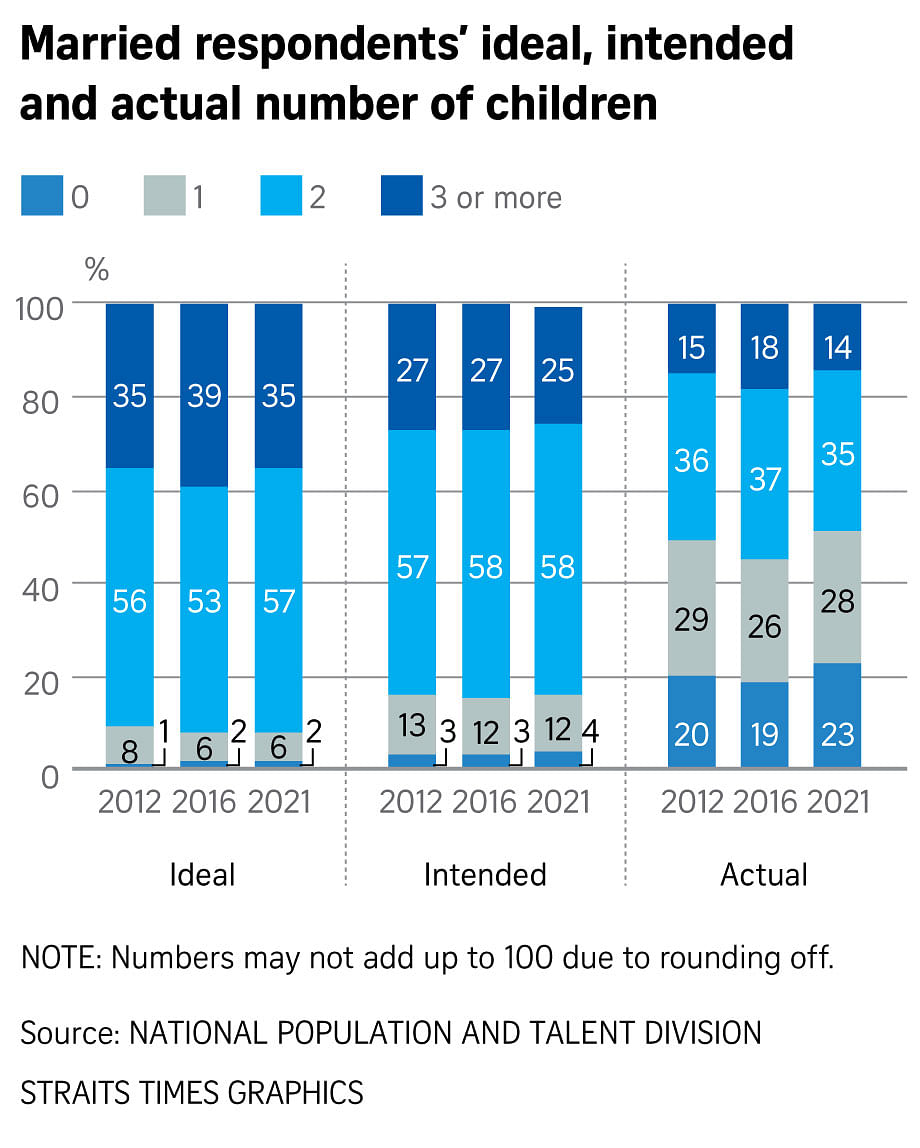8 in 10 young single S'poreans want to marry: Survey
Sign up now: Get ST's newsletters delivered to your inbox

The 2021 survey data showed that marriage and parenthood aspirations among Singaporeans have stayed largely the same.
ST PHOTO: GIN TAY
SINGAPORE - The desire to form families remains strong in Singapore, with about eight in 10 young singles indicating they want to marry, a recent Marriage and Parenthood survey found.
Although a majority of 80 per cent of the singles aged 21 to 35 polled in the survey wanted to marry, the proportion has been declining over the years. In 2016, it was 83 per cent and in 2012, it was 86 per cent.
The results of the survey, conducted between February and June 2021, were released by the National Population and Talent Division on Monday.
Similar to the past, a majority of singles aged 21 to 45, or three-quarters of them, felt that having a career and raising a family were equally important, while 14 per cent put family as a more important priority than career.
About 77 per cent of the singles indicated that they wanted to have children.
In the survey, there were 2,848 singles - referring to those who had never been married - and 3,017 married respondents aged between 21 and 45 years old.
Of those who were married, a vast majority - 92 per cent - indicated that they wanted to have two or more children, similar to the past surveys conducted in 2016 and 2012.
Despite this high proportion of respondents wanting to have children, half of the married respondents had one or no children.
The top three common reasons cited by married respondents who did not want to have more children were financial cost, already having enough children and the stress of raising children.
Money remains a key factor for those looking to have more children as well.
The top factor in determining whether or when to have more children among married respondents was feeling financially secure.
The 2021 survey data showed that marriage and parenthood aspirations among Singaporeans have stayed largely the same, although there have been some shifts in views such as perceptions of caregiving responsibility, and openness to dating apps.
Shift in views on caregiving
Almost all (99 per cent) married respondents agreed that fathers and mothers were equally important as caregivers to children, and 95 per cent agreed that both parents should share equal responsibilities at home, same as the 2016 survey results.
The data also showed that the proportion of those who agreed with the statement - "Ideally, the mother should take care of her children full-time" fell over the years.
For single respondents, this fell from 40 per cent in 2016 to 24 per cent in 2021, while for married respondents, this fell from 56 per cent to 40 per cent.
However, the survey also found that married women continued to do more at home compared with their husbands, in particular in the area of child-related care.
On average, women spent about six hours on a normal weekday on childcare, and 10 hours on weekends, while men spent 3.6 hours on weekdays and 7.7 hours on weekends.
Women were also found to be less satisfied with the division of domestic labour compared with the men, with 59 per cent of women saying they were happy with the division, compared with 72 per cent of men.
Two weeks of paid paternity leave, which was introduced in 2017, seems to play a key part in couples having children.
About 97 per cent of married respondents agreed that paternity leave allowed fathers to play a bigger role in their newborn baby's life while 77 per cent felt paternity leave would make or had made it easier for them to have children.
Flexible work arrangements are also a key factor in encouraging couples to have children, according to the data.
A large majority of married respondents agreed that the availability of such arrangements would make or had made it easier for them to start a family (90 per cent) and have more children (81 per cent).
Singapore Management University sociology professor Paulin Straughan, one of the appointed research consultants of the survey, said that as Singapore continues to progress and mature as a society, there is a convergence with the global shift towards more liberal attitudes on gender roles and expectations of marriage.
She added: "There is a change in attitude towards children, where people are more likely to see child-raising as an intrinsically meaningful experience, rather than a transactional one, for example, for support in old age."



